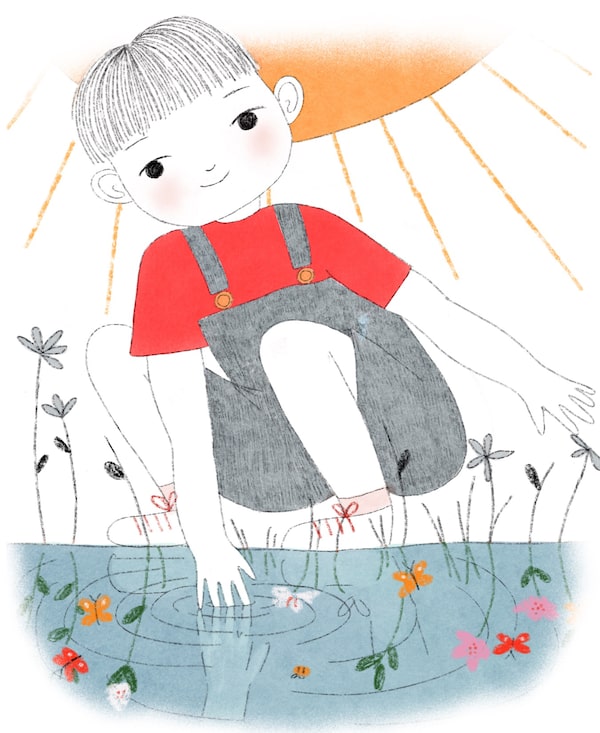
Illustration by Chelsea O'Byrne
First Person is a daily personal piece submitted by readers. Have a story to tell? See our guidelines at tgam.ca/essayguide.
“Snow!” shouts my 18-month-old in delight every time we leave the house.
He’s too young for me to explain that what he’s seeing is actually a record-breaking amount of snow for early November in Toronto. That it could be another sign of climate change, an off-kilter atmosphere throwing more and more meteorological surprises our way. That by the time he’s 12, it’s highly likely we’ll have gone past the point of no return. A 2018 report by the United Nations states that by 2030, we need to cut carbon dioxide emissions by 45 per cent or it’ll be impossible to limit global warming to an increase of 1.5 C by 2100.
He’s too little for all of that, and so his eyes shine with the mystery and majesty of the early November snow.
I discovered I was pregnant with him one August morning in the bathroom at work. I kept the news to myself until I got home that night and told my husband he’d soon be a father. Those secret hours were the only ones that belonged to just me and my boy, then just a miraculous flicker of life deep inside of me.
What would the future look like for this new human we’d created? I wondered. I knew that climate change was spiralling out of control; I had read a report from an Australian-based think tank in which some scientists warned that humanity could go extinct before I have a chance to die an old woman in my bed. We’d thought long and hard about whether it was responsible to bring a new life into this reality of uncertainty and, it often feels, chaos.
We were aware that having children is one of the worst things you can do for the environment.
Ultimately, biology and blind optimism – that maybe things would turn around, that maybe it wouldn’t be so bad, that we’d raise an engaged citizen capable of changing the world – won out. And so that day, for those few hours, I harboured my secret and hoped that the world would be good to this innocent being who hadn’t asked to be born into a world in crisis.
Now a toddler, nature is a dreamscape to him, full of curiosities to examine and explore. The way a butterfly balances with such stillness on the edge of a delicate leaf before spreading its wings wide and fluttering into the distance. The way a puddle ripples when you dip your finger into its murkiness. The way a lone ant seems to possess such determination as it goes about its business.
At what point will he understand that the love of nature we share comes with a great responsibility to protect it? When will he discover that many of the birds he finds so delightful as they hop around our front yard are dying off in droves? How will I tell him that the Arctic he learns about in books is melting away and starting to take entire species with it?
How will I break the news that Australia is burning, the Amazon rain forest is being destroyed and hurricanes are increasingly wiping out entire communities because humans weighed profit or preservation and chose profit?
Parenting has always been a million tiny heartbreaks, but parenting in the time of climate change comes with its own unique ache. Each time I see that sparkle in my son’s eyes as he holds out his hand to touch a flower or examines tiny blades of grass between his fingers or gazes into the verdant trees that sway in the summer wind, I’m desperate to bottle up his innocent admiration for the natural world so he can keep it forever.
But as a parent in the time of climate change, it’s my duty to keep that bottle away from him (especially if it’s plastic). Even though he doesn’t know it yet, his education in protecting the present and future of our Earth has already begun. From his wardrobe of secondhand clothes to his bins of used toys acquired from local buy and sell groups, from his environmentally friendly shampoo to his reusable snack bags, we are doing what we can to limit our family’s environmental impact and teach him about sustainability, even if it’ll be a few years before he can say the word.
As he grows older, we’ll plant trees and join shoreline cleanups, serve as citizen scientists and raise our voices for climate solutions.
Yet right now, as I watch him splash and explore, laugh and blow kisses, I wonder how long true childhood innocence can last these days. How long can I let him believe the world is an inherently good place, that his future is secure simply because he is loved? How long until he finds out that the Earth that feels so firm beneath his feet is actually hovering on the precipice of – what? Total destruction within our lifetimes? Within two generations, three, four? How long will it take?
But like every parent in the time of climate change, I must continue to break through the fear and anxiety and let that blind, but necessary optimism guide me and my family to action. The same optimism that led us to bring new life into this world in the first place, mingled with the hope I held so close that August morning.
Having a child may be the worst thing you can do for the environment, but when I look into my son’s baby blues as we head outdoors and see that spark, that wonder, that love for nature that almost seems too big for his age, I am optimistic, I am hopeful.
As a parent in the time of climate change, I have to be.
Emily Dontsos lives in Toronto.